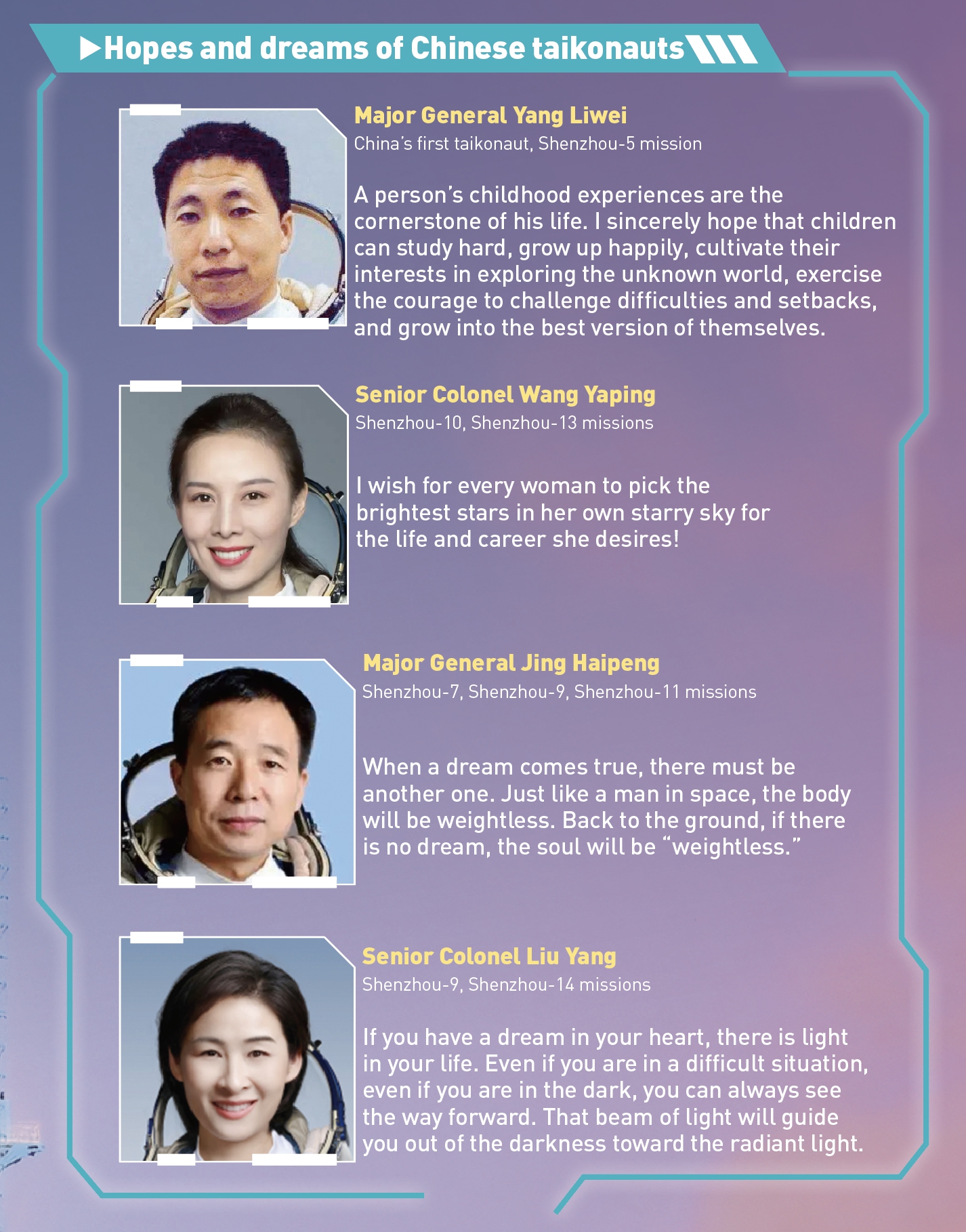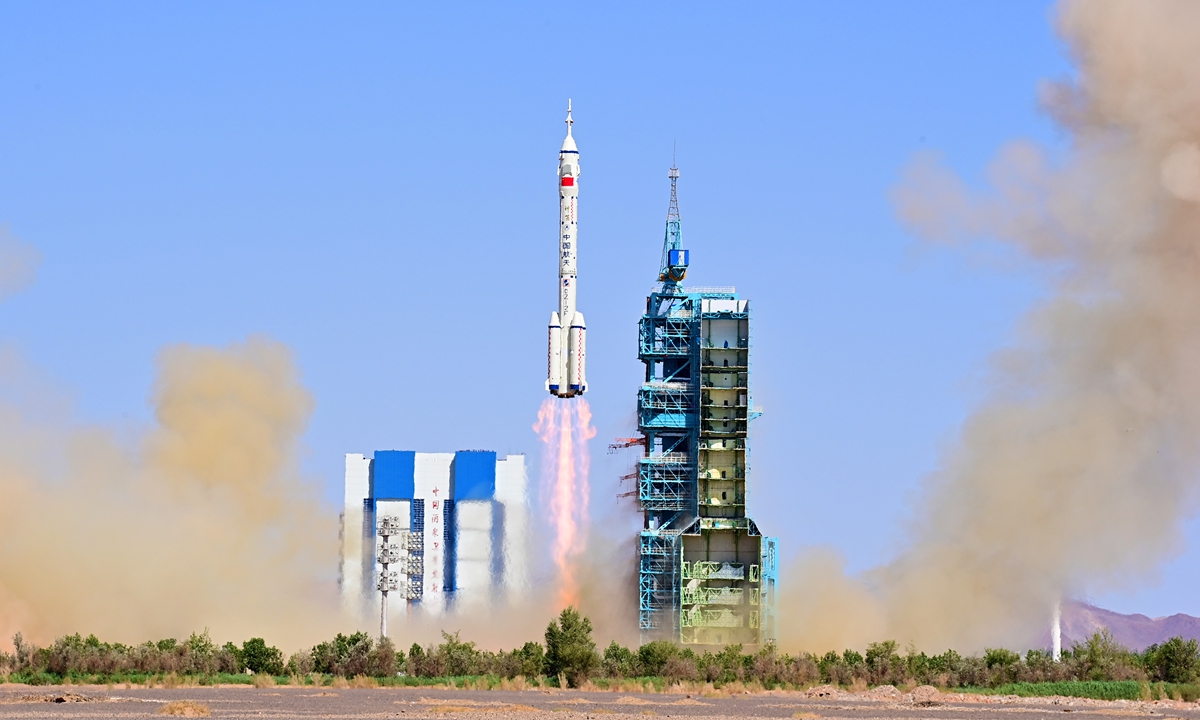【Global Time】Our conquest is the sea of stars: Taikonauts growing up from hardship, poverty kindled ‘Chinese Dream’ with diligence and persistence
2022-06-09 15:36:00
ciwa
Sitting atop the Long March-2F Y14 carrier rocket and carrying three taikonauts, China's Shenzhou-14 spaceship is launched successfully from the Jiuquan Satellite Launch Center in Northwest China's Gansu Province on June 5, 2022. Photo: VCG
Space, the final frontier, is the farthest and most outward territory on which human dreams can be reached.
The ancient Chinese had dreamed of outer space, and now with generations of great efforts placed in the past couple of decades, China has now produced 14 taikonauts who have traveled to the space and they represent the 1.4 billion Chinese people.
On Saturday, three Chinese taikonauts - Senior Colonel Chen Dong, Senior Colonel Liu Yang and Senior Colonel Cai Xuzhe - moved into China's Tianhe space station core module and Tianzhou-3, Tianzhou-4 cargo spacecraft combination after having initiated their six-month-long Shenzhou-14 space mission earlier that day.
The taikonauts are among the elites from among "one of the 100 million." While they have become the focus of the whole country and have captured global attention, their stories of hailing from relatively vulnerable backgrounds, conquering countless difficulties and striving for success are no less inspirational.
Theses Chinese taikonauts did not grow up with Star Wars or Star Trek. But no matter how tough life is, one can't live without dreams - they looked up to the sky and promised themselves that they would move onward, following their own path with diligence and courage.
These stories are vivid examples of the realization of the "Chinese Dreams," and have inspired youngsters in China to dream about space and the stars, encouraged them to pursue their own dreams. They have made the children understand that no matter what their circumstances are, their dreams are still valid and likely to come true.
Small seeds grow into big dreams
When taikonaut Cai was a little boy, he always saw fighter planes flying over the roof of his home in North China's Hebei Province.
Whenever young Cai heard the rumble of the aircrafts, he would rush out to look on obsessively. He would carefully tell apart the colors, shapes, and sizes of different aircrafts, with a dream gradually growing in his heart.
Cai was born in the rural area of Shenzhou, Hebei Province in 1978, a year that marked the beginning of the China's reform and opening-up that brought new opportunities for the younger generations.
During his boyhood, Cai always admired heroes who had fought for the motherland. His teenage-year "idol" was Wang Hai, a Chinese air force fighter pilot and a flying ace in the Korean War (1950-53) who combated the Americans more than 80 times and damaged 29 enemy planes.
At 19, Cai left home to become a student at a military aviation school in Baoding, just 130 kilometers from his hometown, and later became a qualified pilot in the air force. With years of trainings on more than 100 courses, including those on physical, mental, and aerospace technologies, Cai finally became a taikonaut and was granted the task of working in China's space station.
"Apart from work, I would like to enjoy the beauty of space and take pictures of beautiful Earth and our country. I want to take a look at the Yangtze River and Yellow River, find my hometown from there, and share it with everyone," Cai said before he entered the spaceship.
Cai is not some exceptional case from the army of the Chinese taikonauts. Many taikonauts are, in fact, from rural families who suffered from hardship and poverty in early stages of their life, which have toughened their personalities.
Senior Colonel Ye Guangfu, who just completed the Shenzhou-13 mission and returned safely back to Earth on April 16, was raised by a single mother in the rural area of Southwest China's Sichuan Province. Perseverance and persistence are the first lessons in life that his mother taught him.
Like Cai, Ye loved to watch planes flying over his village. He would sit on a slab stone, which the family used to wash clothes, and dreamed of becoming a pilot.
Major General Zhai Zhigang, born in a small village in Northeast China's Heilongjiang Province in 1966, had a less-than-charmed life as his father suffered from a long-term illness and his mother was illiterate.
When he was young, his mother would raise money by selling sunflower seeds. During the dark moments, Zhai had considered dropping out of school, but his mother was furious with his idea and she encouraged Zhai to carry on forward bravely.
On September 27, 2008, during the Shenzhou-7 mission, Zhai, wearing the Chinese-developed Feitian space suit, became the first Chinese to walk in space.
Major General Nie Haisheng, who has completed three space missions, is from an extremely impoverished farming family with eight children in Central China's Hubei Province.
When he was young, Nie did not have new clothes to wear and often had to walk barefoot.
However, in school, Nie was a smart child and was joked at as being the "king of math." Knowing the difficulties his family had to face, Nie worked hard and became a pilot in the PLA Air Force in 1987. In 1998, he became one of the first 14 trained-to-be taikonauts selected from 1,506 excellent pilots in China
Women power
Among the 14 taikonauts are two women who also have represented the images of contemporary Chinese women of excellence, confidence, independence, and courage in the pursuit of their goals.
Liu Yang, the only woman taikonaut in the Shenzhou-14 space mission, is from a village in Central China's Henan Province.
This is the second time that Liu will have performed a space mission. Liu, 43 now, is also China's first woman in space who was selected as a crew member of the Shenzhou-9 in 2012 and was in charge of performing scientific experiments.
Liu had little knowledge of space when she was young. She had dreamed of becoming an office worker, a lawyer, or a doctor. Fortunately, in 1997 when the People's Liberation Army Air Force came to provincial capital Zhengzhou to recruit pilots, Liu was selected when she was in her final year in senior high.
Liu is well known for her hard work. Thirteen years after she joined the PLA Air Force, she was selected to join the pool of the taikonaut candidates in 2010 after having achieved a record of 1,680 hours' safe flights for 13 years as a transport aircraft pilot. She won her claim to fame in 2003 after making a safe landing despite birds getting struck in the engine of her plane.
"To be fighters, not performers" has been Liu's motto since she began flying aircrafts. She undertook arduous and intensive training programs and never gave up during this process. When she first experienced the rotating chair, which stimulates a sense of balance to help reduce side effects on the human body in a zero-gravity environment, Liu got sick in five minutes. But it takes 15 minutes to get full marks. She then tried to divert her attention on the chair by every means and eventually she made it.
Despite the various difficulties in the training, Liu was optimistic. In the two years of taikonaut training, she never went shopping or saw a movie. Her hard work paid off and she became the country's first woman taikonaut.
Liu also gave birth to two children during the decade after she completed her first space mission. She received a PhD degree in 2018 from the Tsinghua University. Compared with her first space trip, Liu appeared more calm this time.
"Space doesn't lower its barriers just because women have come, and the environment in space doesn't treat you differently because you're a woman," she said. As a female taikonaut, Liu proved that women can hold up half sky - a popular saying commonly used in China to praise women's contribution to the world. This time, she will leave a new mark in space.
"I will build a big house in space to accommodate many people's dreams. I will take lots of beautiful photos and share with others when I come back. I will write blessings and dreams into the stars. Mom will do what I promise you," Liu wrote to her two children before she started the six-month Shenzhou-14 space mission on Sunday.
Senior Colonel Wang Yaping, the only female taikonaut of Shenzhou-13 mission, grew up in a cherry-planting family in Yantai, East China's Shandong Province.
Wang was a top student in school and was good at sports as well. At 17, she joined the PLA Air Force to become a pilot.
In 2003, when China's first taikonaut Yang Liwei successfully traveled in the space, 23-year-old pilot Wang thought: "Now China has a man taikonaut, when there would be a woman taikonaut?" She made up her mind to become one of them.
During the Shenzhou-13 mission, Wang also gave two space lessons to children while inside the Tiangong space station. While delivering knowledge about space, she is also sparking dreams in the hearts and minds of the young generations.

Graphic:GT


